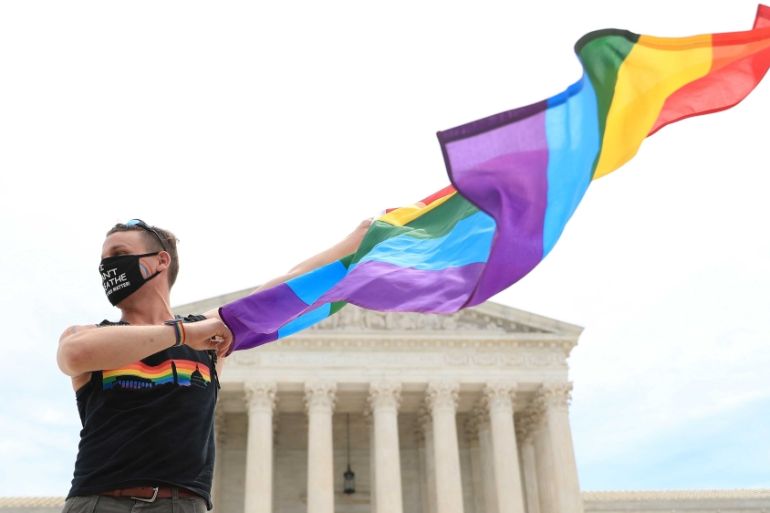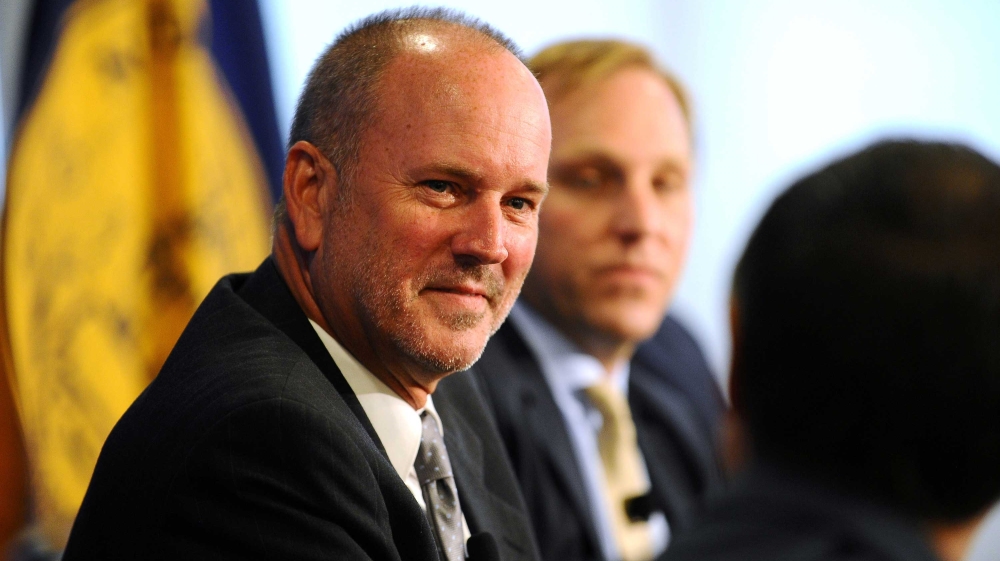Rights groups hail landmark US ruling protecting LGBT workers
Twenty-eight states lacked laws that would protect gay and transgender employees against workplace discrimination.

Rights groups hailed a US Supreme Court decision on Monday, that barred workplace discrimination against gay and transgender employees, calling it a watershed victory for LGBT rights and a defeat for President Donald Trump’s administration.
The landmark 6-3 ruling represented the biggest moment for LGBT rights in the United States since the Supreme Court legalized same-sex marriage nationwide in 2015. Two conservative justices joined the court’s four liberals in the decision: Neil Gorsuch, a 2017 Trump appointee who wrote the ruling, and Chief Justice John Roberts.
Keep reading
list of 3 itemsRayshard Brooks’ fatal shooting: What we know so far
Family want answers after Black man found hanging in California
The justices decided that gay and transgender people are protected under Title VII of the Civil Rights Act of 1964, which bars employers from discriminating against employees on the basis of sex as well as race, colour, national origin and religion.
“The Supreme Court’s historic decision affirms what shouldn’t have even been a debate: LGBTQ Americans should be able to work without fear of losing jobs because of who they are,” said Sarah Kate Ellis, president of the gay rights group GLAAD.
Workplace bias against gay and transgender employees had remained legal in much of the country, with 28 US states lacking comprehensive measures against employment discrimination. The ruling – in two gay rights cases from Georgia and New York and a transgender rights case from Michigan – recognises new worker protections in federal law.
At my first job, I was stealth out of survival. I wasn't out as trans because I was afraid of being fired. Today's #SCOTUS ruling will encourage so many more folks to move beyond that fear. We honor you, Mrs. Aimee Stephens, for your fight. I know you're looking down on us.
— Raquel Willis (@RaquelWillis_) June 15, 2020
‘Finally’
The legal fight focused on the definition of “sex” in Title VII. The plaintiffs, along with civil rights groups and many large companies, had argued that discriminating against gay and transgender workers was inherently based on their sex and consequently was illegal.
“Finally. Today, the law, justice and fairness are on our side,” said Kevin Jennings, CEO of Lambda Legal, an organisation that advocates for LGBTQ rights.
“We have a long way to go in securing the full and undeniable civil rights of LGBTQ people, especially those in our community who are Black, Indigenous and people of color for whom their sexual orientation or gender identity is only one of many barriers to equal opportunity in this country,” Jennings said in a statement.
Trump’s administration had backed the employers who were sued for discrimination. The administration and the employers argued that Congress did not intend for Title VII to protect gay and transgender people when it passed the law. Gorsuch conceded that point in his opinion but said what mattered was the text of the law.
In this moment of national crisis, it’s heartening to have good news from the Supreme Court! Today is a watershed moment for fairness and equality and affirms that LGBTQ people are, and should be, protected from discrimination under federal law. 1/4 pic.twitter.com/8BNQlOn9hH
— National Center for Transgender Equality (@TransEquality) June 15, 2020
“An employer who fires an individual for being homosexual or transgender fires that person for traits or actions it would not have questioned in members of a different sex,” Gorsuch wrote. “Sex plays a necessary and undisguisable role in the decision, exactly what Title VII forbids.”
Trump said at the White House on Monday he will live with the Supreme Court decision and called the ruling a very powerful decision.
Strongly supported by evangelical Christian voters, Trump has taken actions that have undermined gay and transgender rights since taking office in 2017.
The fight for justice continues, but today we celebrate the US Supreme Court decision that federal employment discrimination laws protect LGBT employees! pic.twitter.com/TfiNlXHDRx
— SisterSong (@SisterSong_WOC) June 15, 2020
‘Just one step’
The court ruled in two consolidated cases about gay people who have said they were fired due to their sexual orientation. One involved a former county child welfare services coordinator from Georgia named Gerald Bostock. The other involved a New York skydiving instructor named Donald Zarda who died after the litigation began, with the matter then pursued by his estate.
“I am elated and I am filled with so much gratitude and appreciation for the justices for making the right decision,” Bostock said on MSNBC on Monday.
“I think this is just one step in laying the groundwork, though, because it underscores given everything going on in our country today that we still have more work to do,” he said.

The court also ruled in a case that involved a transgender funeral director named Aimee Stephens fired by a Detroit funeral home after revealing plans to transition from male to female. Stephens died in May. Stephens’s wife Donna is now representing the estate.
“I am grateful for this victory to honor the legacy of Aimee, and to ensure people are treated fairly regardless of their sexual orientation or gender identity,” Donna Stephens said in a statement.
Today’s decision handed down by #SCOTUS is another step toward ensuring full protection of LGBTQ individuals across the country, regardless of their sexual orientation or gender identity. https://t.co/btyN4W1J9u
— Human Rights Campaign (@HRC) June 15, 2020
The Human Rights Campaign gay rights group called the decision “a landmark victory for LGBTQ equality”.
Alphonso David, the group’s president, said: “No one should be denied a job or fired simply because of who they are or whom they love.”
Especially at a time when the Trump Administration is rolling back the rights of transgender people and anti-transgender violence continues to plague our nation, this decision is a step towards affirming the dignity of transgender people, and all LGBTQ people.
— Sarah Kate Ellis (@sarahkateellis) June 15, 2020
The White House had no immediate comment.
Trump’s administration last week issued a rule that would lift anti-discrimination protections for transgender people in healthcare.
His administration also backed the right of certain businesses to refuse to serve gay people on the basis of religious objections to gay marriage, banned most transgender service members from the military and rescinded protections on bathroom access for transgender students in public schools.